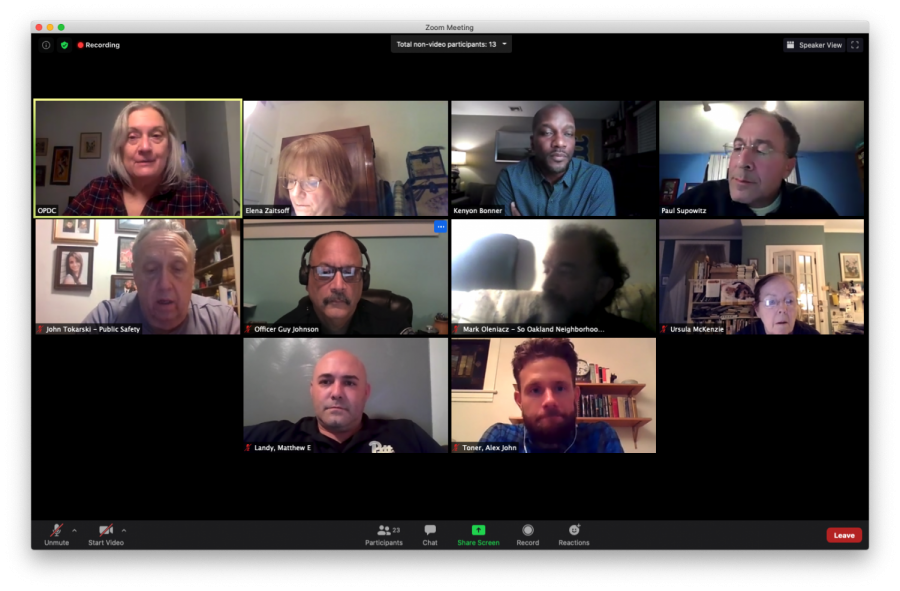Over 300 students receive code of conduct violations for COVID-19 infractions
The Oakland Planning and Development Corporation’s monthly Oakwatch meeting included two featured speakers from Pitt — Kenyon Bonner, vice provost and dean of students, and Paul Supowitz, vice chancellor for community and governmental relations.
November 20, 2020
More than 300 students have received code of conduct violations for breaking COVID-19 mitigation protocols this semester, according to Vice Provost and Dean of Students Kenyon Bonner.
“As of this afternoon, we found 310 or 311 students responsible for violating the student code of conduct on the Pittsburgh campus,” Bonner said. “We will continue to refer students when we have enough information, and they’ll go through the process, and if they’re found responsible, then there are sanctions for those students.”
Code of conduct violations were one of the COVID-19-related items discussed at Wednesday evening’s Oakwatch meeting hosted by the Oakland Planning and Development Corporation. Bonner and Paul Supowitz, vice chancellor for community and governmental relations, also focused on Pitt’s mitigation efforts this semester and guidance for the spring.
The over 300 students who received violations are just a fraction of the number of students who were reported to the University for COVID-19 related infractions. Bonner said the University’s Office of Compliance, Investigation and Ethics has received 876 comments from its anonymous reporting tool — COVID Concern Connection.
But, Bonner said Pitt can’t act on situations it doesn’t receive enough information about, such as complaints without addresses or complaints of parties after they’re over.
OPDC’s Neighborhood Quality Consultant Lizabeth Gray said Oakland residents have complained about “disruptive” and “dangerous” behavior from Pitt students, such as parties. Bonner confirmed that there have been complaints of large parties and gatherings, and that the University has taken action when students are in violation of the student code of conduct.
Students living on campus who attend large parties can have their housing suspended for the semester, and students living off campus can be switched to persona non grata status, preventing them from entering University buildings or property. Pitt temporarily suspended nine Greek life organizations — a quarter of all chapters active before the pandemic — for alleged conduct violations in August. The suspension has since been removed on all nine chapters.
Amid the recent rise of COVID-19 cases on campus, attributed to parties and large social gatherings over Halloween weekend, Supowitz said Pitt is in a “tremendously dynamic situation” that requires an “all hands on deck” approach from the University. He added that the administration has been working “consistently and diligently” to protect students and slow the spread of the virus.
“Up until the last couple of weeks, we had really done an amazing job, I think, with keeping the virus at bay in the University community, and especially compared to other institutions and even at times, as compared to the region around us,” Supowitz said.
Pitt added 54 new COVID-19 cases, composed of 50 students and four employees, between last Friday and Monday, with 99 students currently in isolation. This comes after an increase of 47 cases between Tuesday and Thursday. This is the third case report since last Monday, when the University moved back to the Elevated risk posture and told students to shelter in place immediately.
Bonner said while Pitt is focused on keeping the campus safe, it is also focused on protecting its Oakland neighbors.
“We started the year with the commitment to, our responsibility for the safety of our students, our faculty, our staff,” Bonner said. “We made it very clear that we were also committed to the safety of our surrounding communities in Oakland. So that was one of the basic tenets of our approach this year.”
OPDC resident chairperson Elena Zaitsoff said she was concerned about whether on-campus students who received housing suspensions would move in with friends in Oakland and be a “detriment” to the Oakland community.
Bonner said only one student has received a housing suspension, and that the University works with students to make sure they have appropriate support.
“That is not our first option for students. We know how serious it is for a student to lose their housing privileges,” Bonner said. “We work with the student to make sure they have the proper support. Once they’re out of the University community, you can’t tell a student where they can and can’t go.”
Alex Toner, vice president of public relations, said he encourages the community to report incidents either by website or phone.
“We continue to encourage community members and residents, even our Pitt community, to utilize our COVID concern reporting tool if they have community-related concerns about COVID and perhaps the behavior of students,” Toner said. “That is reviewed and monitored by the compliance committee, so we keep track of all those complaints and act on them if necessary.”
At the meeting, Bonner also praised a number of “innovative” efforts from Pitt this semester such as a new “compliance team” and the off-campus safety ambassador program. He said Pitt plans to evaluate COVID-19 mitigation initiatives for the spring semester when students leave campus next week.
“The environment is changing rapidly right in front of us, so it’s hard to say what our spring will look like and what our strategy will be,” Bonner said. “There are some new ideas we’ll have to come up with depending on what we’re dealing with in the spring as new guidance comes in and new orders are coming in.”
Bonner added that the foundation of Pitt’s approach is to establish a culture on campus where students come together as a community.
“The foundation of what we are doing on campus is to try to establish a culture,” Bonner said. “And that culture is the culture of really pulling together as a community and supporting each other and doing what’s right to protect ourselves and our neighbors.”








